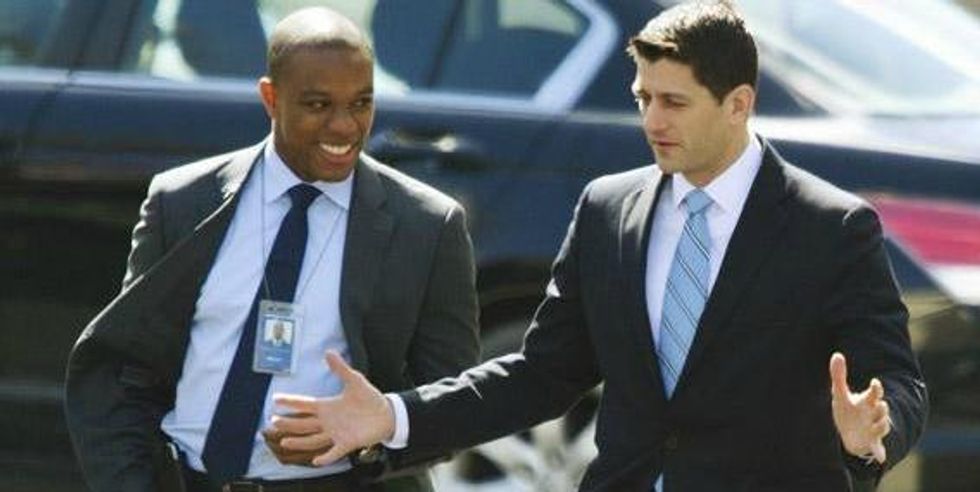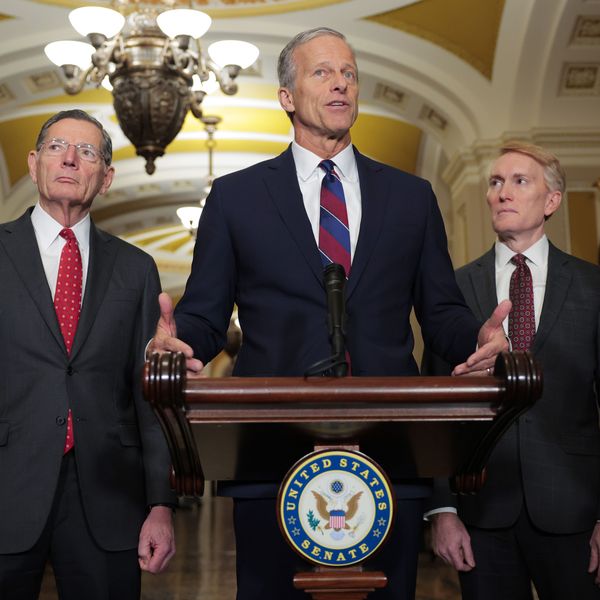Critics: Ryan's GOP Austerity Budget Only Dangerous If Democrats Play Along
Rep. Paul Ryan throws down austerity gauntlet for House GOP, but real concern should be how Democrats counter this austerity drive

Ahead of the official announcement, however, Ryan explained in a Wall Street Journal op-ed that though his "opponents will shout austerity," it is most important for people to see plan's proposals "in perspective."
Of course, those who call Ryan's budget a form of "austerity" are well-informed enough to put their critiques "in perspective."
Here's economist Robert Reich, fitting Ryan's latest plan into the historical perspective that says the Obama administration and Democrats continue their "failure to reshape" the debate surrounding the contrived hysteria around deficit spending.
Austerity economics -- of which Ryan's upcoming budget is the most extreme version -- is a cruel hoax. Cruel because it hurts most those who are already hurting; a hoax because it doesn't work.
The entire framework is based on the false analogy that the federal budget is akin to a family's budget.
Families do have to balance their budgets. But that's precisely why the federal government has to be the spender of last resort when consumer spending falls short of boosting the economy toward full employment.
Dave Johnson, at the Campaign for America's Future, says the lense that Americans should be viewing the Ryan budget (pdf) through is the one that recognizes the already extreme levels of economic inequality in the US. In the name of gaining "perspective," he urged his readers to watch this video before reading Ryan's new budget:
Johnson argues the only thing the GOP budget will stabilize is the hold of the nation's richest and most powerful on the wilting fruits of an economy tilted to benefit those at the top.
Cutting government spending has never caused an economy to grow. And cutting government spending has always caused economies to shrink. The Republican budget's plan to "balance" the budget assumes the opposite of this. In Europe this experiment has been tried, economies shrank, the shrinkage caused revenues to fall, and promises of prosperity and balance resulted in the opposite. Unemployment is approaching 26% in some of the countries that tried this experiment in cutting government.
But cutting government spending -- the things We, the People do to make our lives better -- does make the already-wealthy much wealthier.
And The Progressive's Ruth Conniff couches her assessment of Ryan's plan "to cut to balance the budget in ten years by making $5 trillion in cuts to Medicaid, food assistance for the poor" and privatizing Medicare by saying that what should worry voters is not what Ryan (predictably) proposes, but what Democrats, especially Obama, will do to meet him "half-way".
Ryan emerged from a lunch with the President last week saying he thinks a deal on spending cuts is possible. That's not good news.
Senator Bernie Sanders has been working hard to pull together a coalition of working people, veterans, and seniors, to sound the alarm about Obama's willingness to cut a deal on so-called chained CPI--a rejiggering of the cost-of-living calculation that would mean big cuts in Social Security benefits for seniors.
Even as Paul Ryan gets his moment in the spotlight this week for a plan that will go nowhere, what we should really be worried about is what the President is doing to strike a deal with the deficit hawks to solve a nonexistent problem and exacerbate suffering for millions of Americans who can afford it the least.
As John Dickerson reports at Slate:
According to conversations with White House officials, the president and his aides know it is a long and contentious process to find common ground with Ryan [...] but showing respect for Romney's former running mate helps ease the partisan tensions a bit. That's a necessary step to putting a deal of any kind together with Republicans. [...]
The theory of the moment is that the president's best route is to take advantage of the pause between crises and work through the slower, slightly more reasonable congressional process. If the regular way of doing things does prove possible, then Ryan and his Democratic counterpart, Sen. Patty Murray, will meet in a conference committee to hash out the partisan disputes over tax increases, cuts in popular domestic programs, and changes to entitlements.
And that's "perspective" for what should scare those who think austerity is exactly the wrong prescription for the ailing US economy.
______________________
An Urgent Message From Our Co-Founder
Dear Common Dreams reader, The U.S. is on a fast track to authoritarianism like nothing I've ever seen. Meanwhile, corporate news outlets are utterly capitulating to Trump, twisting their coverage to avoid drawing his ire while lining up to stuff cash in his pockets. That's why I believe that Common Dreams is doing the best and most consequential reporting that we've ever done. Our small but mighty team is a progressive reporting powerhouse, covering the news every day that the corporate media never will. Our mission has always been simple: To inform. To inspire. And to ignite change for the common good. Now here's the key piece that I want all our readers to understand: None of this would be possible without your financial support. That's not just some fundraising cliche. It's the absolute and literal truth. We don't accept corporate advertising and never will. We don't have a paywall because we don't think people should be blocked from critical news based on their ability to pay. Everything we do is funded by the donations of readers like you. Will you donate now to help power the nonprofit, independent reporting of Common Dreams? Thank you for being a vital member of our community. Together, we can keep independent journalism alive when it’s needed most. - Craig Brown, Co-founder |

Ahead of the official announcement, however, Ryan explained in a Wall Street Journal op-ed that though his "opponents will shout austerity," it is most important for people to see plan's proposals "in perspective."
Of course, those who call Ryan's budget a form of "austerity" are well-informed enough to put their critiques "in perspective."
Here's economist Robert Reich, fitting Ryan's latest plan into the historical perspective that says the Obama administration and Democrats continue their "failure to reshape" the debate surrounding the contrived hysteria around deficit spending.
Austerity economics -- of which Ryan's upcoming budget is the most extreme version -- is a cruel hoax. Cruel because it hurts most those who are already hurting; a hoax because it doesn't work.
The entire framework is based on the false analogy that the federal budget is akin to a family's budget.
Families do have to balance their budgets. But that's precisely why the federal government has to be the spender of last resort when consumer spending falls short of boosting the economy toward full employment.
Dave Johnson, at the Campaign for America's Future, says the lense that Americans should be viewing the Ryan budget (pdf) through is the one that recognizes the already extreme levels of economic inequality in the US. In the name of gaining "perspective," he urged his readers to watch this video before reading Ryan's new budget:
Johnson argues the only thing the GOP budget will stabilize is the hold of the nation's richest and most powerful on the wilting fruits of an economy tilted to benefit those at the top.
Cutting government spending has never caused an economy to grow. And cutting government spending has always caused economies to shrink. The Republican budget's plan to "balance" the budget assumes the opposite of this. In Europe this experiment has been tried, economies shrank, the shrinkage caused revenues to fall, and promises of prosperity and balance resulted in the opposite. Unemployment is approaching 26% in some of the countries that tried this experiment in cutting government.
But cutting government spending -- the things We, the People do to make our lives better -- does make the already-wealthy much wealthier.
And The Progressive's Ruth Conniff couches her assessment of Ryan's plan "to cut to balance the budget in ten years by making $5 trillion in cuts to Medicaid, food assistance for the poor" and privatizing Medicare by saying that what should worry voters is not what Ryan (predictably) proposes, but what Democrats, especially Obama, will do to meet him "half-way".
Ryan emerged from a lunch with the President last week saying he thinks a deal on spending cuts is possible. That's not good news.
Senator Bernie Sanders has been working hard to pull together a coalition of working people, veterans, and seniors, to sound the alarm about Obama's willingness to cut a deal on so-called chained CPI--a rejiggering of the cost-of-living calculation that would mean big cuts in Social Security benefits for seniors.
Even as Paul Ryan gets his moment in the spotlight this week for a plan that will go nowhere, what we should really be worried about is what the President is doing to strike a deal with the deficit hawks to solve a nonexistent problem and exacerbate suffering for millions of Americans who can afford it the least.
As John Dickerson reports at Slate:
According to conversations with White House officials, the president and his aides know it is a long and contentious process to find common ground with Ryan [...] but showing respect for Romney's former running mate helps ease the partisan tensions a bit. That's a necessary step to putting a deal of any kind together with Republicans. [...]
The theory of the moment is that the president's best route is to take advantage of the pause between crises and work through the slower, slightly more reasonable congressional process. If the regular way of doing things does prove possible, then Ryan and his Democratic counterpart, Sen. Patty Murray, will meet in a conference committee to hash out the partisan disputes over tax increases, cuts in popular domestic programs, and changes to entitlements.
And that's "perspective" for what should scare those who think austerity is exactly the wrong prescription for the ailing US economy.
______________________

Ahead of the official announcement, however, Ryan explained in a Wall Street Journal op-ed that though his "opponents will shout austerity," it is most important for people to see plan's proposals "in perspective."
Of course, those who call Ryan's budget a form of "austerity" are well-informed enough to put their critiques "in perspective."
Here's economist Robert Reich, fitting Ryan's latest plan into the historical perspective that says the Obama administration and Democrats continue their "failure to reshape" the debate surrounding the contrived hysteria around deficit spending.
Austerity economics -- of which Ryan's upcoming budget is the most extreme version -- is a cruel hoax. Cruel because it hurts most those who are already hurting; a hoax because it doesn't work.
The entire framework is based on the false analogy that the federal budget is akin to a family's budget.
Families do have to balance their budgets. But that's precisely why the federal government has to be the spender of last resort when consumer spending falls short of boosting the economy toward full employment.
Dave Johnson, at the Campaign for America's Future, says the lense that Americans should be viewing the Ryan budget (pdf) through is the one that recognizes the already extreme levels of economic inequality in the US. In the name of gaining "perspective," he urged his readers to watch this video before reading Ryan's new budget:
Johnson argues the only thing the GOP budget will stabilize is the hold of the nation's richest and most powerful on the wilting fruits of an economy tilted to benefit those at the top.
Cutting government spending has never caused an economy to grow. And cutting government spending has always caused economies to shrink. The Republican budget's plan to "balance" the budget assumes the opposite of this. In Europe this experiment has been tried, economies shrank, the shrinkage caused revenues to fall, and promises of prosperity and balance resulted in the opposite. Unemployment is approaching 26% in some of the countries that tried this experiment in cutting government.
But cutting government spending -- the things We, the People do to make our lives better -- does make the already-wealthy much wealthier.
And The Progressive's Ruth Conniff couches her assessment of Ryan's plan "to cut to balance the budget in ten years by making $5 trillion in cuts to Medicaid, food assistance for the poor" and privatizing Medicare by saying that what should worry voters is not what Ryan (predictably) proposes, but what Democrats, especially Obama, will do to meet him "half-way".
Ryan emerged from a lunch with the President last week saying he thinks a deal on spending cuts is possible. That's not good news.
Senator Bernie Sanders has been working hard to pull together a coalition of working people, veterans, and seniors, to sound the alarm about Obama's willingness to cut a deal on so-called chained CPI--a rejiggering of the cost-of-living calculation that would mean big cuts in Social Security benefits for seniors.
Even as Paul Ryan gets his moment in the spotlight this week for a plan that will go nowhere, what we should really be worried about is what the President is doing to strike a deal with the deficit hawks to solve a nonexistent problem and exacerbate suffering for millions of Americans who can afford it the least.
As John Dickerson reports at Slate:
According to conversations with White House officials, the president and his aides know it is a long and contentious process to find common ground with Ryan [...] but showing respect for Romney's former running mate helps ease the partisan tensions a bit. That's a necessary step to putting a deal of any kind together with Republicans. [...]
The theory of the moment is that the president's best route is to take advantage of the pause between crises and work through the slower, slightly more reasonable congressional process. If the regular way of doing things does prove possible, then Ryan and his Democratic counterpart, Sen. Patty Murray, will meet in a conference committee to hash out the partisan disputes over tax increases, cuts in popular domestic programs, and changes to entitlements.
And that's "perspective" for what should scare those who think austerity is exactly the wrong prescription for the ailing US economy.
______________________

